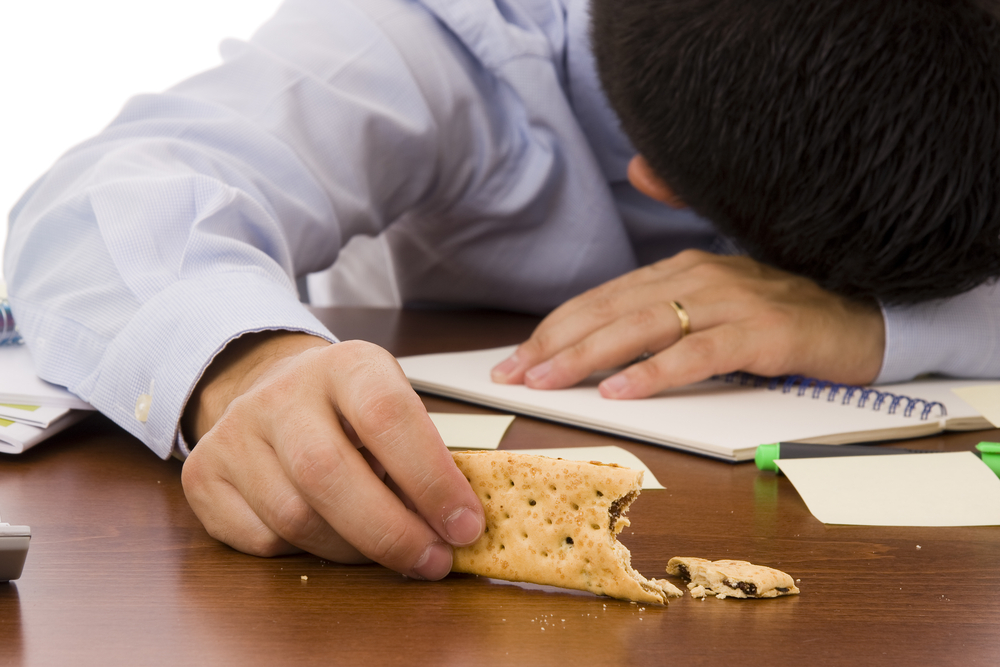According to a poll taken by the American Dietetic Association, roughly 70-percent of American workers eat lunch at their desks several times per week. Now, you might think you can get a lot more done if you dine as you do spreadsheets or munch as you crunch financial reports. However, as you pick away at your keyboard as you pick away at that bag of chips, you’re not doing yourself any favors.
Here are eight reasons why eating at your desk is not a healthy habit…
1. You’re Eating in Bacteria—Ewwww!
Dinning at your desk means eating in a virtual heyday of bacteria! I’m not kidding, microbiology researchers at University of Arizona report that your desk is far dirtier than the company bathroom, almost 400-times filthier, in fact! And if that didn’t already put you off your sandwich, guess what happens when you start eating and then walk away from that egg salad mid-nosh to go to a meeting for an hour? Suddenly your lunch becomes a bacteria-feeding ground.
2. You Tend to Opt for Fatty Foods
A study conducted by Visa found that when Americans opt for convenience food lunches, an average of twice per week, those desk eaters tend to make less healthy food choices—for instance they depend on quick rather than quality meals like caloric-, trans fat-, sodium-rich, and starchy snack foods, fast foods, frozen dinners, and (gasp) vending machine dining options.
3. You’re Sedentary for Longer
It’s simple math really, when you lunch at your desk; you sit for an extra hour each day. And regardless of if your workday is 8, 9, or 12 hours—desk eating tacks on additional time to your workday. Alternatively, going out to get your lunch from a café and then walking to a nearby park ensures you get in a few extra steps and a quick physically active break.
4. Robs You of Vitamin-D
I’ve come to appreciate a stroll at lunchtime, yes for the physical activity, but also for the mood boosting benefits. Just 10-minutes in the sunshine and this skin-absorbing nutrient will lift your mood, decrease work stress, level out blood sugar, and banish depression and negative thoughts.
5. Mindless Eating Means Eating More
Desk eating equals mindless eating—you know the meals you eat as you answer emails and read paperwork, and suddenly you’ve mowed through an entire foot long sub! Preoccupied noshing doesn’t allow your body and brain don’t properly realize you’re full so you end up overeating and gaining weight.
6. You Miss the Social Work Experience
Force yourself to eat away from your desk and you’ll suddenly realize how much you like your co-workers. The social aspect of work is important to create a sense of team, lower stress, and encourage productivity, according to a study from the Massachusetts Institute of Technology (MIT).
7. Your Body Needs an Energy Boost
Don’t believe in the benefits of a walk midday? Psychologists from Stockholm University claim that nothing beats a mid-afternoon energy slump like a brisk walk. In fact, short bursts of exercise will boost productivity enough to make the time you took away from your computer totally worthwhile!
8. Your Mind Doesn’t Get a Break
Brainstorming at work, but short on ideas? Getting away from your desk, either to sit outside or go for a stroll at lunch will ensure you return to work refreshed and more productive. So says Stanford University’s Graduate School of Education, who linked a lunchtime stroll with improved creativity.











